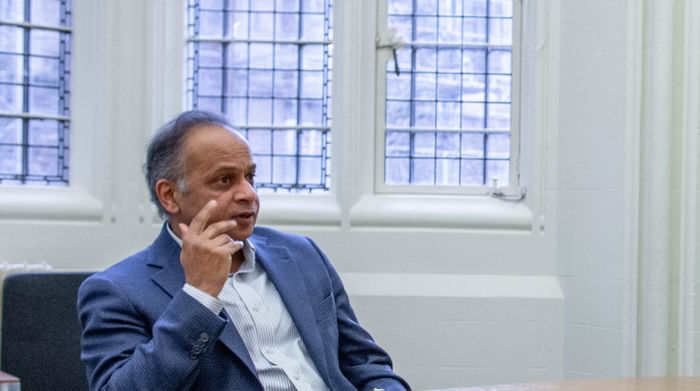Former Green party leader Baroness Natalie Bennett pronounces centrist politics ‘dead’
Cambridge Young Greens Chair Josh Morris-Blake questions Green grandee on NIMBYism, first-past-the-post and how she stays optimistic

Since Natalie stepped down as leader of the Green party seven years ago, she hasn’t exactly retired from politics. “I only returned from Paris this morning,” she tells me as we cram into Fitzbillies on a Monday afternoon. She has made this short window available between back-to-back Zoom calls and speaking at the Pembroke Politics Society across the road – and then heading back to London for another manic day tomorrow.
According to The Sunday Times, Natalie is the peer who has contributed the most since the start of 2020, with more than 1,089 contributions in the House of Lords. This seems to be a trend within the Green party. Her fellow Green peer, Jenny Jones, was one of only two peers with 100% attendance in the last parliamentary session. Data from Wirral council shows that Green councillors report far more issues on behalf of residents than any other party.
I ask Natalie why this is the case. “Greens have something different to say, in every conceivable area of policy.” Outside of the established duopoly of the two-party system, Greens are forced to work harder for each vote and each second of media coverage.
“You can’t have infinite growth on a finite planet. That’s not politics, that’s physics”
Natalie’s first contribution as a Baroness was a proposal to abolish the Lords and replace it with an elected second chamber — a key Green party policy. So was there any unease about accepting a peerage? I receive an adamant rebuttal. “We have to work with the current system so we can get in there and change it.” She elaborates: “We got more votes in the general election in 2015 than we’d got in every previous election added together and we still only got one MP, [so] the only way those people can be represented in Parliament is by this route under our current broken system.”
The Greens have long been held back by the first-past-the-post electoral system, and Natalie references a recent survey which found that 19% of voters would back the Greens if they believed every party had an equal chance of winning. That vote would deliver over 120 MPs. At the local level, however, the party has already started to win big. Since 2019, the Greens have more than quadrupled their number of councillors across the country, and is the largest party in nine local authorities. Natalie firmly believes that “we can beat first past the post”. In Cambridge, the Greens have four councillors, most recently gaining the student-heavy Newnham ward from Labour last May.
Despite a growing local base, Cambridge is unlikely to be a seat the Greens will take at the next general election. So why should students still back the Greens at next year’s expected poll? I get a two-pronged answer. Firstly, a dismissal of the notion that students should “hold their nose”: “People have been voting tactically in Britain for decades. And look where it’s brought us. If people vote for what they believe in, that’s the route towards getting what they want.” Secondly, a more practical call-to-arms: total vote share “really matters” for “how you’re treated by the media, how you’re regarded by the pundits, what kind of access you get.”
“Green political philosophy gives us a different way of looking at the world”
As success grows, so do new threats. “You have to prepare for the problems of success,” she warns. Most notably, the transition from being ignored to being attacked by your rivals takes some adjusting to.
But the criticisms levelled at the Greens have remained the same for decades; from accusations of NIMBY (“Not In My Back Yard”) politics, which stalls much-needed housing development in the name of conservation, to being far too idealistic. Natalie has a presumably much repeated response: “You can’t have infinite growth on a finite planet. That’s not politics, that’s physics.” It’s a blunt response and one which her party will need to continue to articulate in the face of mounting attacks from mainstream media.
Despite these obstacles, Natalie reflects the increasingly bullish and optimistic sentiment of the Greens in recent months, confidently stating that 2024 will see “the next generation of green MPs” elected to Parliament.
She contrasts the Greens’ momentum with the direction of the Labour party under Keir Starmer: “Centrist politics is dead. [It] means leaving things much as they are. The market has failed, privatisation has been a disaster. Green political philosophy gives us a different way of looking at the world.”
I finish by asking Natalie how she maintains momentum. Her answer is ominous, intriguing and stirring: “Where we are now is profoundly unstable. The one thing I know is that things are not going to stay the same.”
 Comment / Cambridge students are too opinionated 21 April 2025
Comment / Cambridge students are too opinionated 21 April 2025 Interviews / Meet the Chaplain who’s working to make Cambridge a university of sanctuary for refugees20 April 2025
Interviews / Meet the Chaplain who’s working to make Cambridge a university of sanctuary for refugees20 April 2025 News / News in brief: campaigning and drinking20 April 2025
News / News in brief: campaigning and drinking20 April 2025 Comment / Cambridge’s tourism risks commodifying students18 April 2025
Comment / Cambridge’s tourism risks commodifying students18 April 2025 Comment / Cambridge’s gossip culture is a double-edged sword7 April 2025
Comment / Cambridge’s gossip culture is a double-edged sword7 April 2025






